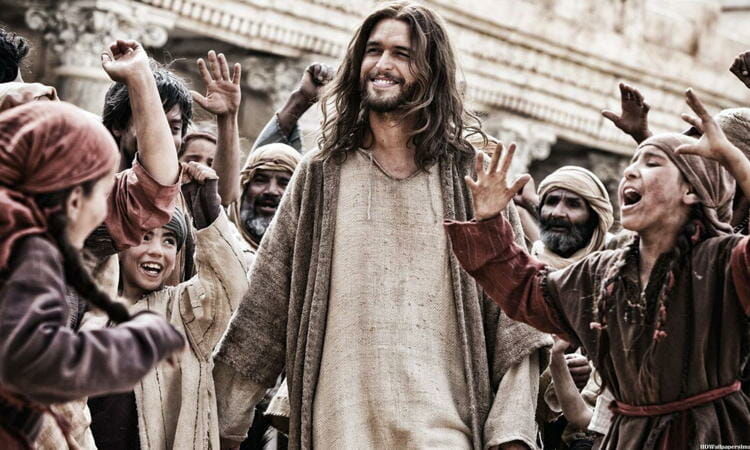By Jim Rohner · March 2, 2014

Through the generations the story of Jesus has been called "the greatest story ever told" and when it comes to bringing his story to the big screen, Hollywood has employed some great filmmakers (George Stevens, Martin Scorsese, Mel Gibson) to match the achievement. These filmmakers have brought a personal touch and interpretation to the story of the life of the man about whom very little has been written in relation to his historical, cultural and religious influence. Despite criticisms from the far right that the mainstream media is godless and heretical, the decades have proven that Hollywood doesn't mind being in the Jesus business.
So favorable is Hollywood to the Jesus business that they occasionally defer more to the "business" than to "Jesus" throwing an easy and uninspired bone to the crowds already trained to appreciate it rather than those who could theoretically learn the most from a true piece of art. To accomplish this goal, they'll employ directors like Catherine Hardwicke (Twilight, Red Riding Hood) and Christopher Spencer (umm….err…) who have proven an affinity for not rocking the boat and delivering the easy paint by numbers translation. Though it purports to be yet another attempt at telling "the greatest story ever told," the primary problem with Son of God is that its inception, creation and distribution was clearly inspired by business and not so much by Jesus.
For anyone who's attended 5 or more years of Sunday School, close the browser and go about your day. There is nothing in Son of God that you will hear or see or learn of the life, teachings or trials of Jesus and his disciples outside of the easily digestible bites that the blue-haired lady or slightly exasperated man relayed to you every Sunday morning. Have you heard that Jesus and his disciples fed 5000 people with only 2 fish and 5 loaves of bread? Did you know that he claimed to be the fulfillment of Jewish law and prophesy and that this claim came across as controversial for the ruling powers at the time? Have you heard that he was crucified in lieu of a convicted murderer and then was resurrected 3 days later much to the disbelief of the followers who abandoned him? If you said "yes" to any of these questions, then you know as much as if not more than the filmmakers who brought Son of God to life. Not only do the writers, producers and director of Son of God want you to know that they're familiar with all the gospel stories, they want you to know that they know ALL of them, cramming as many miracles, teachings and Bible verses into the film's 138-minute running time as they possibly can, frequently forgetting that the whys and hows of Jesus's life and times can supplement the whats.
But Son of God isn't too concerned with helping people understand or analyze the truly controversial teachings that Jesus proclaimed or the circumstances that led to his death as much as it's concerned with marking off checks next to the bullet points of the canon that it seems to hold holier than anything. Passion of the Christ was criticized for its brutality and guilt tripping and The Last Temptation of Christ was chastised for veering off the printed page into the realm of speculation, but at least those two films were bold enough to contain an authorial voice that declared to the masses "this is how this story that's been told so many times resonates with me." Christopher Spencer, who almost surely got this job due to the work he's done on History's "The Bible," seems to be content to say what others have said before, like a children's yearly obligatory Nativity play but with more professional actors and the ability to shoot in locations that could pass for the deserts of Israel. Yes, the words are all spoken verbatim and the deeds are all faithfully re-enacted, but if Son of God were a painting, it would be a Thomas Kinkade, fitting comfortably into the expectations of what its audience already wanted, offering nothing to those who are skeptical, or for that matter, even mildly curious about the motivation behind the brush strokes or composition.
There seems to be either a fear in deviating from what the gospels say or an apathy towards reaching anyone to whom the chorus has already been sung. There is no inherent problem in trying to retell "the greatest story every told," but the cinema, with a pre-established structure that defines it irrevocably from other art forms, contains the potential (or problem, depending on who you ask) for telling a story in a certain way, a way that assures that if plot points are hit in a timely manner and characters are written deftly enough, an emotionally satisfying conclusion can be reached. Son of God ignores the artful structure of film and settles instead to copy the Bible's words and paste them visually on screen so that the biggest question answered is "I wonder what Jesus looked like" (a Caucasian with perfectly white teeth, by the way) rather than "I wonder how Jesus handled being both human AND divine" (probably not easily).
There was clapping and cheering in my theater when the credits rolled and while I couldn't join them, I also couldn't fault them. The people who were clapping and cheering were always going to clap and cheer, assuming Jesus didn't remove himself from the cross, walk into Pilate's chamber and flip him the bird. They were always going to clap and cheer because Son of God wanted them to clap and cheer. It didn't want them to question, it didn't want them to discuss, it just wanted them to clap and cheer. It also helped that they paid full ticket price before doing so.